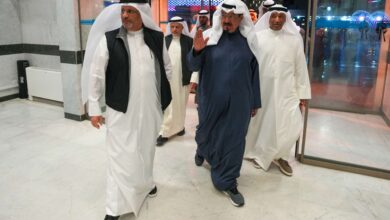
In a clear indication of the government’s commitment to achieving and accelerating the implementation of its development plan projects, expenditures on development projects in Kuwait have seen a significant increase since the beginning of December. The spending index recorded a rise of approximately 11%, reaching a total of 262 million dinars, an increase of 134 million dinars.
Official figures, reviewed by Al-Qabas, revealed a noticeable progress in the implementation of development projects in Kuwait. The number of projects in the delivery phase has increased to 8, while 67 projects are currently in the implementation phase, and 42 projects are in the preparation phase.
Additionally, the number of projects that have not been started for various reasons has decreased to just 16 out of a total of 133 projects outlined in the development plan for the current fiscal year 2024-2025.
Approximately 39 government agencies are involved in implementing the development plan projects for the current fiscal year 2024-2025. Infrastructure projects make up the largest share, with about 36 projects totaling a cost of around 428 million dinars.
In addition, 16 projects aimed at enhancing the role of the private sector in the Kuwaiti economy are being undertaken, with a total cost of 72 million dinars. Projects focused on enhancing health and community welfare are also significant, with 19 projects allocated a budget of about 140 million dinars.
Remove Obstacles
Since the beginning of the fiscal year 2024-2025, officials have been focused on driving the implementation of major development projects by addressing and removing obstacles that have previously hindered project execution. These challenges, which include technical, administrative, and financial barriers, are being systematically resolved.
The Ministry of Finance emphasized, in its circular to government agencies, the importance of giving the highest priority to development projects within the government’s work plan. This focus is crucial in achieving economic and social objectives, correcting any deviations, and removing obstacles that may hinder the successful implementation of these projects.
Disbursement Priority
Regarding the necessary spending rules, the Ministry of Finance emphasized the importance of implementing the projects of the 2024-2025 Annual Development Plan in strict accordance with the plans and approvals provided by the General Secretariat of the Supreme Council for Planning and Development.
The Ministry stressed that all government agencies must take the necessary measures to begin implementing these projects in coordination with the relevant authorities, starting from the beginning of the fiscal year 2024-2025. Additionally, it is crucial that spending on these projects aligns with the allocated budget for each initiative.
The Ministry highlighted the importance of all concerned and supervisory agencies prioritizing the projects outlined in the Annual Development Plan. It emphasized the need for these agencies to expedite the completion of all procedures related to the projects.
Tender Committee
Since its restructuring, the Tender Committee has focused on prioritizing development plan projects. Through its review of numerous tenders and practices, the committee has played a key role in accelerating the implementation of projects across Kuwait in recent months.
In the past few months, the Council of Ministers has made a concerted effort to hold several of its meetings at the headquarters of major development projects. This approach has had a significant impact on the pace of implementation, as the Council frequently discussed the progress of these projects with the direct involvement of those responsible for them. This proactive engagement has contributed positively to advancing the completion of these vital projects.
The statement from the Council of Ministers also highlighted, on multiple occasions, the importance of accelerating the completion of development projects. It emphasized the need to activate specific international agreements and facilitate the attraction of international expertise to ensure that these projects are implemented according to global standards.












